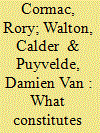| Srl | Item |
| 1 |
ID:
083101


|
|
|
|
|
| Publication |
2008.
|
| Summary/Abstract |
Recently declassified Security Service (MI5) records reveal, for the first time, the full extent of the threat that Zionist terrorism posed to British national security immediately after the Second World War. It is well established within the historical literature that after 1945 Britain faced violent campaigns by Jewish terrorist groups in the Mandate of Palestine. Hitherto unacknowledged in the historiography, however, is the fact that the threat of Zionist terrorism extended from Palestine to Britain itself. This article studies the nature of the threat posed by Zionist terrorism within Britain after 1945, and explores the counter-terrorist measures that MI5 devised to meet it. Overall, as this article shows, MI5's concerns with Zionist terrorism after 1945 offer a striking new interpretation of the history of the early Cold War
|
|
|
|
|
|
|
|
|
|
|
|
|
|
|
|
| 2 |
ID:
183704


|
|
|
|
|
| Summary/Abstract |
Covert action has long been a controversial tool of international relations. However, there is remarkably little public understanding about whether it works and, more fundamentally, about what constitutes success in this shadowy arena of state activity. This article distills competing criteria of success and examines how covert actions become perceived as successes. We develop a conceptual model of covert action success as a social construct and illustrate it through the case of ‘the golden age of CIA operations’. The socially constructed nature of success has important implications not just for evaluating covert actions but also for using, and defending against, them.
|
|
|
|
|
|
|
|
|
|
|
|
|
|
|
|